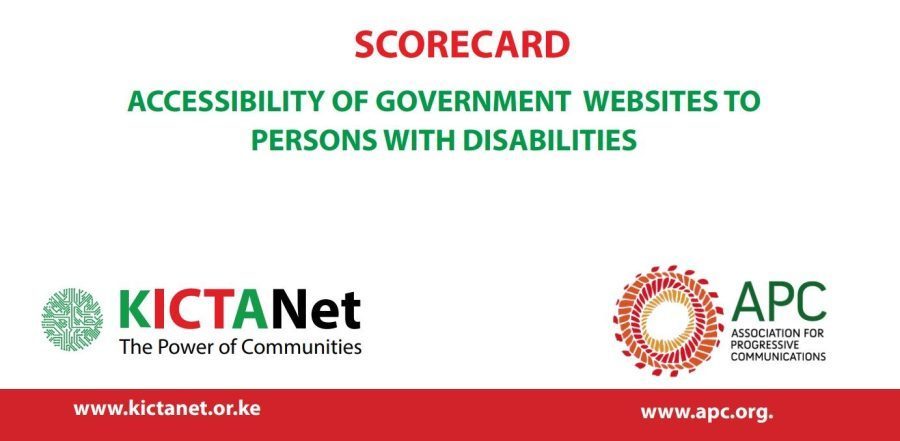The KICTANet ICT Access and Equality for Persons with Disabilities Team in celebration of Global Accessibility Awareness Day on 18th May 2023, launched a scorecard report on the Accessibility of Government Websites to Persons with Disabilities (PWDs).
It sought to identify the stakeholders’ challenges and identify priority areas, potential solutions, and best practices moving forward in promoting accessibility.
This report launch comes against the backdrop of the ongoing implementation of the Kenya National Digital Master Plan 2022-2032. The findings from this scorecard provide a platform for dialogue on the status of digital accessibility for persons with disabilities on public websites in Kenya.
The launch which was in a hybrid format was attended by various local and international stakeholders from the government, civil societies and other institutions. They included the Communications Authority, Ombudsman, ADD International, ITAC Consulting Ltd, Inclusive Tech Group, IAWRT, InABLE, Inter News, NDPK, Disability Africa Consulting, The Society of Professionals with Visual Disabilities and individual persons with disabilities who are enthusiastic about digital accessibility.
In her opening remarks, Ms Liz Orembo, KICTANet Trustee noted that KICTANet gives utmost importance to digital accessibility for persons with disabilities in various platforms and forums. It is in cognisance of this that the Network introduced the ICT Access and Equality for Persons with Disabilities project which works directly with Persons with Disabilities in Kenya.
The purpose is to influence PWDs’ access to ICTs, their lived experiences, and their input towards ICT policy in Kenya. Ms Orembo emphasised that to be left out digitally is to be left out in societal progress. Accordingly, digital accessibility not only means access to information and services but also the ability to participate actively in online platforms.
Ms Judy Okite, the KICTANet ICT Access and Equality project lead reiterated that it is worth noting that “as much as we are calling for accessibility in the websites, we are not advocating for change of content. The information posted for public consumption should remain the same for all. This is to promote equity and equality in access to information and online services, supported by the constitutional provision of the right to access information as a basic human right (Constitution of Kenya 2010, Article 35)”.
While presenting the first part of the scorecard (that can be accessed in this link), Ms Florence Awino, one of the assistant researchers and Digital Accessibility fellow at KICTANet shared how various barriers impact digital economic empowerment and appointments in various leadership positions, employment by companies, businesses, government and other institutions. She noted that one of the challenges for persons with disabilities in ICT is shunning a website that is not accessible to them, and thereby missing various services and opportunities.
Following up, Nicodemus Nyakundi a Digital Accessibility fellow at KICTANet who participated in the scorecard development presented the websites’ ratings (that can be accessed in this link), and recommendations from the focus group discussions. Nyakundi added that the digital divide being experienced currently is likely to widen if proper measures are not taken to ensure inclusivity in the digital space.
A panel discussion followed and constituted of panellists from the Communication Authority, The Society of Professionals with Visual Disabilities, and the Ombudsman Commission of Administrative Justice.
This open discussion which involved active engagement with the attendees both online and in-person delved into ways of seeking collaborations to improve policies and drive policy implementations and regulations, the challenges that persons with disabilities face in the digital world such as low literacy levels, assessment and registration of persons with disabilities, affordability of assistive technology, sustainability of accessibility projects and programs, adherence to ICT standards, institutional compliance and the role of Communication Authority.
In one accord the panelists agreed that the need to have an open platform for persons with disabilities to share their experiences in accessing online services is due. Such platforms will provide the mechanism for ensuring their input is considered in the development and improvement of websites.
None of the websites satisfactorily met the accessibility requirements, meaning that persons with disabilities have been constantly receiving incomplete information. This scorecard, therefore, is an eye-opener of how far the country is in meeting average accessibility to public websites for persons with disabilities. However, there is room for improvement. Persons with disabilities must be engaged in the entire process of web development. They must be involved in the implementation, and be part of the continuous assessment of the platforms.
As technology evolves so would be accessibility needs. We need to keep pace with emerging technologies to ensure accessibility!
The full report can be accessed via this link. Accessibility of Government Websites to Persons with Disability
Nicodemus Nyakundi is an ICT Access and Equality Fellow for PWDs at KICTANet. He has a background in IT and advocates for digital inclusivity.
![]()





To be given chances in the government offices